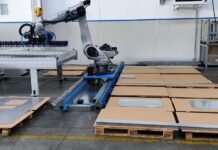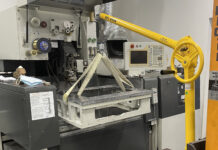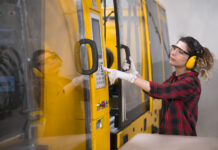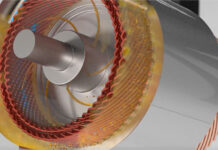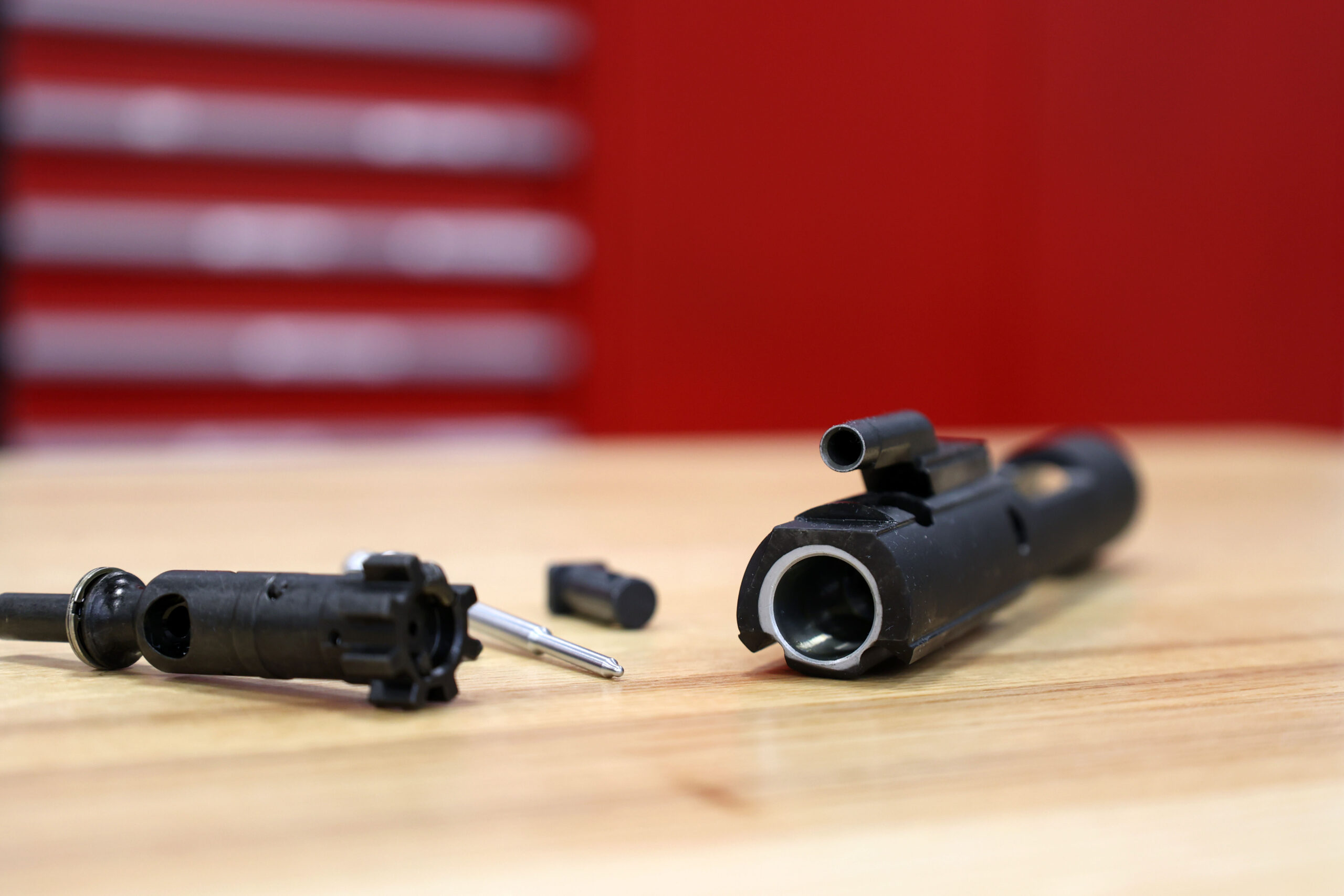
The firearm industry has made major advancements from its earliest known ancestor, the fire lance—a bamboo tube containing gunpowder as well as pellets or pottery shards that could be ignited to eject a stream of flames with the projectiles. With centuries of advancements, modern firearms now make up an ever-growing industry with nearly 40 million firearms sold in the United States in 2020 according to USA Today. The progression of this industry can be traced back to the precision machining process. From surface finish to tool life to material used, machining firearm components rely heavily on efficiency and accuracy.
Previously, when machining firearms, some processes were manual or utilized numerous different tools; however, as tooling innovations have developed, the process of machining has evolved. Oftentimes, tools now are far superior to those used in previous firearm production methods. This provides the opportunity to combine operations into a single cutting tool, eliminating the need for additional tooling in the machine shop. In addition, new innovations in tooling provide manufacturers with a better output like improved surface finish or decreased cycle time. Nevertheless, there is still a need to work toward standardizing tooling in the firearm industry. While manufacturers often have their own take on the radius, angle change, etc., standardization is becoming more common. For example, a standard reamer could be used for all one-inch diameter holes in an AR upper receiver; however, there could still be a delay in acquiring the tools if specific reamers are needed because of the needs of different specs.
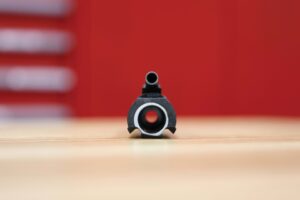 Holemaking and hole finishing are part of the machining process for numerous firearm components. One example of this would be revolver cylinders, which in some cases require a three-step process: pre-drill, pre ream, and finish ream. Form is critical throughout these applications because it must match the bullet casing. Other firearm components that need holemaking and hole finishing applications include AR upper receivers, gas blocks and bolt carriers, which house the firing pin and bolt itself.
Holemaking and hole finishing are part of the machining process for numerous firearm components. One example of this would be revolver cylinders, which in some cases require a three-step process: pre-drill, pre ream, and finish ream. Form is critical throughout these applications because it must match the bullet casing. Other firearm components that need holemaking and hole finishing applications include AR upper receivers, gas blocks and bolt carriers, which house the firing pin and bolt itself.
In deciding what type of material to use in firearm components, manufacturers must consider a few characteristics: weight, strength and aesthetic. Take steel as an example. It is durable and versatile, making it easier to manipulate into the small parts needed within firearms, yet it is a heavier material. While this does present some challenges, it also provides better control and repeatable accuracy. Conversely, when using aluminum, strength and durability are compromised for the benefit of less weight; therefore, it is best to consider a type of aluminum alloy.
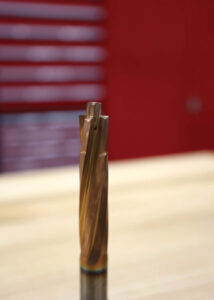 Ultimately, the materials used must be reliable because of the stress they are put under, the heavy usage, and the strict requirements of the industry itself. While firearms are often heat-treated, it is best to complete holemaking applications prior to this; after being heat-treated, the material is typically too hard for drills because it is as if machinists are asking two like materials to get along. Instead, the drill should be harder than the material you are drilling; something that is challenging to achieve.
Ultimately, the materials used must be reliable because of the stress they are put under, the heavy usage, and the strict requirements of the industry itself. While firearms are often heat-treated, it is best to complete holemaking applications prior to this; after being heat-treated, the material is typically too hard for drills because it is as if machinists are asking two like materials to get along. Instead, the drill should be harder than the material you are drilling; something that is challenging to achieve.
Whether it is alloys, titaniums or another high-grade exotic material, tool life is vital in the holemaking and finishing applications. One of the key needs of manufacturing firearms is sequential, repeatable processes; thus, tool life is needed to maintain optimal production cycles. Although tool life issues like dulling or breaking can sometimes be easily resolved by switching to a different geometry or coating, there are times where greater changes need to be implemented. Chatter, for example, can cause poor tool life, so manufacturers would need to evaluate their fixturing, work holding or machine maintenance in general. Performing machine maintenance or replacing tooling ultimately impacts production time, so it is best to utilize rigid machines and high-grade materials when possible.
Surface finish is one of the most important elements when machining firearm components such as bolt carriers, upper and lower receivers, and silencers. More specifically, surface finish is key for firearm chambers because of the need to accept the incoming cartridge, which determines the accuracy of the rifle and the load being fired on target. When drilling or reaming, surface finish is critical—the smoother the surface finish the less friction and less wear. Clearly, there needs to be a smooth and consistent finish free of burrs; otherwise, this becomes a fracture point. Ultimately, surface finish impacts the functionality of the machined firearm while negatively impacting the life of the barrel as well.
At the same time, there needs to be consistent wear coming from the finishing tools and on the finished part itself so that there is no excessive friction or wear. Here, CNC operations provide the most accuracy and consistency while creating a process that can be easily replicated. Not only do manual processes produce an inconsistent surface finish, but they also are more costly to production and the well-being of the operator—both of which impact product quality. Therefore, CNC machining improves the performance and life of the firearms because of the ability to remove microscopic peaks and valleys in the material.
Machining firearms clearly requires precision and efficiency. Whether drilling or reaming, it is necessary for machine shops and manufacturers to develop a process that is repeatable, sequential and effective in producing the high standards—like that of surface finish—needed in the firearm industry.
About Allied Machine & Engineering:
Allied Machine & Engineering is a leading manufacturer of holemaking and finishing tooling systems. Allied devotes its advanced engineering and manufacturing capabilities to creating the widest selection of value-added tooling available to metal-cutting industries around the world. Our tooling solutions deliver the lowest cost per hole in a wide range of drilling, reaming, threading, boring, and burnishing applications.
Located in Dover, Ohio, Allied’s precision holemaking technologies provide end-users worldwide with the highest level of drill performance. Precision engineering and expert application support make Allied the first and best choice for solving complex metal-cutting challenges.



